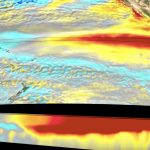 June 20, 2018 12:12 am
Published by Climate Extremes
June 20, 2018 12:12 am
Published by Climate Extremes
Using novel techniques developed by the supervisory team, the PhD candidate will evaluate the role of diabatic processes in the ENSO cycle, and how they may change in the future, using new observations and state-of-the-art model simulations. This research is critical to improving our ability to project future climate change.
 May 18, 2018 3:38 am
Published by Climate Extremes
May 18, 2018 3:38 am
Published by Climate Extremes
CLEX researchers writing in Nature Climate Change suggest a paradigm shift in how climate scientists approach climate change impact assessments. They suggest examining the system or potential catastrophe first instead of making the starting point a climate scenario.
 April 30, 2018 1:59 am
Published by Climate Extremes
April 30, 2018 1:59 am
Published by Climate Extremes
Centre of Excellence researchers have identified 12 marine heatwave types off the east coast of Tasmania, a location recognised as a global warming hotspot. Here the average sea surface temperatures here have been rising at four times the global average and trends in marine heatwaves are showing significant increases in number.
 April 26, 2018 11:41 pm
Published by Climate Extremes
April 26, 2018 11:41 pm
Published by Climate Extremes
World-first modelling research– which used several million CPU hours in Australia’s fastest supercomputer, Raijin, and ran calculations non-stop for over a year – has revealed the Southern Ocean mixes water between the depths and surface far more easily than previously thought.
 April 9, 2018 6:30 am
Published by Climate Extremes
April 9, 2018 6:30 am
Published by Climate Extremes
An international study in Nature Communications co-authored by researchers from the ARC Centre of Excellence for Climate Extremes (CLEX) and the Institute of Marine and Antarctic Studies (IMAS) reveals globally marine heatwaves have increased over the past century in number, length and intensity as a direct result of warming oceans.
April 3, 2018 5:09 am
Published by Climate Extremes
Book launch: Sunburnt Country: the history and future of climate change in Australia by Joelle Gergis.
 April 1, 2018 12:07 am
Published by Climate Extremes
April 1, 2018 12:07 am
Published by Climate Extremes
New research published in Nature Geoscience has found that climate engineering that modifies the properties of the land surface in highly populated areas and agricultural areas over North America, Europe and Asia could reduce extreme temperatures there by up to 2-3°C.
 March 19, 2018 1:23 am
Published by Climate Extremes
March 19, 2018 1:23 am
Published by Climate Extremes
The Australian Academy of Science with 21 other Commonwealth National Academies of Science and societies as part of a consensus statement calling on the members at the next Commonwealth Heads of Government Meeting (CHOGM) to use the best available science to guide action on climate change. The call comes at a time when research has shown that the commitments of the Paris Accord agreed to by international governments will still put the world on track for temperatures 3°C above preindustrial temperatures.







